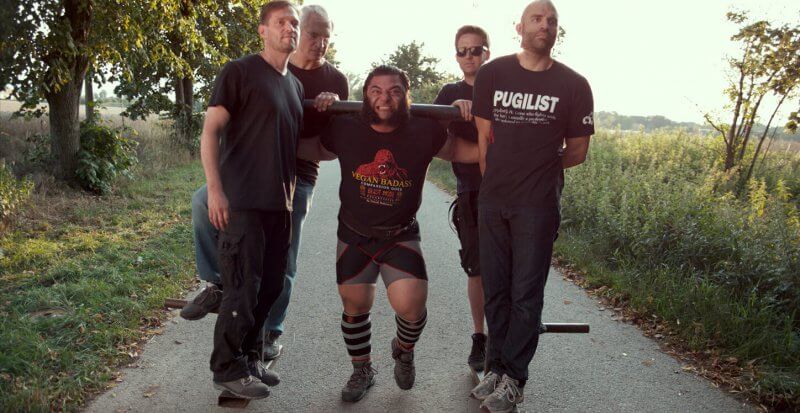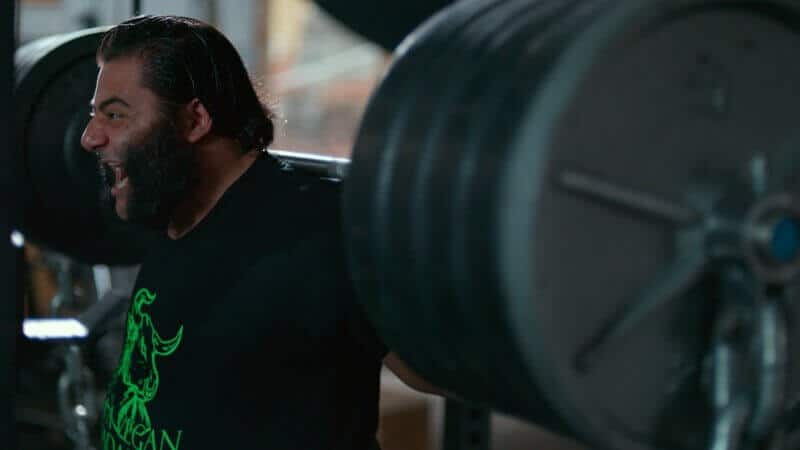Vegan athletes: Top 10 athletes & their plant-based diet

Did you know that more and more athletes are choosing a vegan diet? Yes, that’s right! Veganism has the potential to revolutionize sports and many athletes prove that you can be successful without animal products. The number of successful vegan athletes is steadily increasing and veganism is becoming a game changer in the field of sports.
Who are these vegan athletes anyway? They are people like you and me who have made a conscious decision to eat a plant-based diet. But what makes them so special? They break with the traditional image of a successful athlete eating vast amounts of meat and dairy products. Instead, they rely on plant-based proteins, proving that top performance can be achieved without animal products.
Whether it’s tennis player Serena Williams or ultra-marathoner Scott Jurek, more and more athletes are swearing by a vegan diet. And for good reason! Studies show that a plant-based diet is not only healthier, but can also improve athletic performance.
In this blog post, we’ll take a closer look at the topic of “vegan athletes” and shed light on why more and more athletes are turning to animal-free diets.
Benefits of a plant-based diet for athletes
Facts based on the following review: Plant-Based Diets for Cardiovascular Safety and Performance in Endurance Sports.
Promoting the regeneration of muscles
Muscle recovery is an important factor for athletes to increase their performance. A plant-based diet can help promote recovery. Plant foods contain many antioxidants and anti-inflammatory substances that can help reduce inflammation in the muscles. In addition, many plant foods are rich in potassium, which plays an important role in muscle recovery.
Reduction of the risk of inflammation in the body
Inflammation in the body can not only be painful, but also affect the performance of athletes. A vegan diet can help reduce the risk of inflammation in the body. Indeed, animal products such as meat and dairy can promote inflammation. Instead, plant-based foods offer a variety of nutrients and antioxidants that can help fight inflammation in the body.
Improve endurance and performance
A plant-based diet can also help improve endurance and performance in athletes. Plant foods contain many complex carbohydrates that can slowly provide energy to the body and thus improve endurance. In addition, many plant foods are rich in iron, which is important for oxygen transport in the body. A lack of iron can lead to tiredness and fatigue.
Vegan protein sources are often also rich in fiber and minerals
Many people mistakenly believe that it is difficult to get enough protein as a vegan. However, there are actually many vegan sources of protein, such as legumes, nuts and seeds, which are not only high in protein, but also rich in fiber and minerals. These nutrients are important for a healthy diet of athletes.
Body weight control
A vegan diet can help control body weight. Plant foods usually contain fewer calories than animal products. Plus, they’re often high in fiber, which can help you feel full faster and thus eat less. Controlling body weight is especially important for athletes, as too high or too low a body fat percentage can impair performance.
Overall, a plant-based diet offers many benefits for athletes. It promotes muscle regeneration, reduces the risk of inflammation in the body, improves endurance and performance, as well as supports a healthy diet through vegan protein sources and control of body weight.
Tips and tricks for starting a vegan diet as an athlete
Sufficient protein through vegan diet
A vegan diet can provide sufficient protein for athletes. There are numerous plant-based protein sources that are just as good as animal products. Soy and lupine products, legumes such as beans, lentils and chickpeas, and nuts and seeds are important components of a vegan diet for athletes. Whole grain products, vegetables and fruits also contain proteins.
It is important to make sure that you are eating enough protein as an athlete. A rough rule of thumb is that one gram of protein per kilogram of body weight per day is sufficient. So for an 80 kg athlete, that would be 80 grams of protein daily. Exactly how much protein you need depends on a few factors.
What vegan athletes eat
Vegan athletes should make sure that they consume enough protein. As mentioned earlier, there are numerous plant-based protein sources that are perfect for an athletic diet. For example, lentil salads with nuts and seeds or a tofu vegetable stir-fry with whole grain rice can serve as main meals.
Snacks and snacks can also be vegan. A handful of nuts or a banana with peanut butter are ideal snacks for in between meals.
How vegan athletes get enough protein
As mentioned earlier, there are numerous plant-based protein sources that are perfect for an athletic diet. It is important to pay attention to a balanced diet and combine different vegetable proteins.
For example, you can eat beans together with rice or enjoy hummus with whole wheat bread. Tofu and tempeh are also excellent sources of vegetable protein.
How vegan athletes get enough calories
Athletes require more calories than non-athletes to maintain performance. Vegan athletes can get those extra calories by eating nutritious foods like legumes, nuts and seeds, and whole grains.
However, it is important to note that you should not only pay attention to the amount of calories, but also to the quality of food. A balanced vegan diet with lots of fruits and vegetables is more important than a diet full of junk food.
Vegetarian athletes
Many well-known athletes are vegetarian or vegan.
Berit Kauffeldt – vegan national volleyball player and mindfulness expert

Who is Berit Kauffeldt?
Berit Kauffeldt, a former professional volleyball player and national player for Germany, has had a remarkable career. She was born on July 8, 1990 in the city of Parchim. As a middle blocker, with an impressive height of 1.90 m, she has played in the top leagues in Europe.
Her career as a professional athlete
She made her beginnings in the sports world at 1. VC Parchim. She then moved to Schweriner SC, where she played between 2007 and 2012. During her time in Schwerin, she achieved the title of German Champion three times, in 2009, 2011 and 2012.
This was followed by a period abroad. First she went to Italy to Cuatto Giaveno Volley and later to Imoco Volley Conegliano. Further stations were Impel Wrocław in Poland, Lokomotiv Baku in Azerbaijan and then it went to France for her, where she first played for Béziers Volley and finally moved to Volley-Ball Nantes in 2017. She ended her active career there in 2018.
Her successes were not limited to club sports. With the German national team she won the silver medal at the European Championship in 2011 and triumphed in the European League in 2013.
Balanced diet and mindfulness in sports
Parallel to her impressive athletic career, Berit Kauffeldt also embarked on an academic path. She earned a master’s degree in psychology and became a trained yoga teacher. Initially, she worked as a sports psychologist at the Bayer 04 Leverkusen soccer club. Then, in 2020, she launched her own business offering coaching, retreats and yoga instruction to a variety of audiences, including athletes, individuals and corporations
David Haye, Sebastian Utz and Ünsal Arik – successful vegan boxers

David Haye: Former heavyweight boxer and vegan since 2014
David Haye is a former British heavyweight boxer who won several world titles in his career. He has been on a vegan diet since 2014 and swears by the benefits of a plant-based diet for his athletic performance.
Haye reports that his vegan diet gives him higher energy and allows him to regenerate faster. He also said he experienced fewer injuries and inflammation than before. However, he also stresses that it is important to ensure adequate protein intake on a vegan diet.
As an ambassador for PETA, David Haye also campaigns for animal rights. In an interview with the organization, he said, “I’m an animal lover and I believe we can all help improve the lives of animals.”
Sebastian Utz: German professional boxer and vegan since 2018
Sebastian Utz is a German professional super middleweight boxer. In 2018, he decided to go vegan to improve his athletic performance.
Utz reports that the switch to a vegan diet was difficult for him at first. However, he said he quickly noticed that it gave him more energy and helped him regenerate faster. In addition, he says, his digestion has improved.
As a vegan, Sebastian Utz is also committed to animal rights. On Instagram, he regularly posts pictures of vegan meals and speaks out against animal testing.
Ünsal Arik: Turkish boxer and vegan since 2016

Ünsal Arik is a Turkish boxer who has been living vegan since 2016. He reports having better fitness and stamina from his vegan diet. He also said he has experienced fewer injuries than before.
Ünsal Arik is also an advocate for animal rights and is involved in animal welfare in Turkey. In an interview with PETA, he said, “I believe we can all help improve the lives of animals.”
We had the privilege of doing an interview with him and are really excited! You can view the interview here .
Lewis Hamilton – Formula professional and world champion

Successful athlete with vegan diet
Lewis Hamilton is a successful British racing driver who has won the Formula 1 World Championship seven times. But in addition to his impressive career on the racetrack, there is another special feature: Hamilton has been eating a vegan diet for several years.
Vegan diet for better performance
Hamilton has chosen a vegan lifestyle for ethical reasons. But his athletic performance should also benefit from this form of nutrition. In interviews, he repeatedly emphasizes that the vegan diet makes him feel fitter and more energetic. His endurance and regeneration are also said to have improved.
But Hamilton is not the only one who swears by the benefits of a vegan diet in sports. Other well-known athletes such as Carl Lewis, Mats Hummels and Chris Paul also live vegan or have at least experimented with it in phases.
Venus Williams – Wimbledon winner and vegan athlete

Venus Williams: A successful tennis player and vegan pioneer
Venus Williams is one of the most successful tennis players of all time. She has won seven Grand Slam titles in singles, including five Wimbledon titles. But Venus Williams is known not only for her athletic successes, but also for her decision to eat a vegan diet.
In 2011, Venus Williams was diagnosed with Sjögren’s syndrome, an autoimmune disease that causes pain in the joints and leads to fatigue. To alleviate her symptoms and improve her athletic performance, Venus Williams opted for a vegan diet.
Venus Williams as a role model for a vegan diet
Venus Williams has not only reaped the benefits of a vegan diet, but also uses her fame to inspire others. She is known for her commitment to animal rights and environmental protection and regularly speaks about the benefits of a plant-based diet.
In an interview withHealth magazine, Venus Williams said, “When I first started, I fell in love with the concept of taking care of my body in the best way possible.” Not only does it help me on the field, but I feel like I’m doing the right thing for me.”
Through her decision to eat a vegan diet and her commitment to animal rights and environmental protection, Venus Williams has shown that it is possible to be successful as an athlete while demonstrating a sense of responsibility towards the environment and animals.
Scott Jurek – ultramarathon runner and vegan

Who is Scott Jurek?
Scott Jurek is a well-known ultramarathon runner from the USA. He has won numerous competitions and is considered one of the best runners of all time. His accomplishments range from multiple wins at the Western States 100-mile trail run, the Badwater Ultramarathon to setting the record at the Appalachian Trail Speed Record.
Why does Scott Jurek eat vegan?
Scott Jurek has followed a vegan diet for many years. He says he decided to go vegan after reading the book “Diet for a New America” by John Robbins. This is about the impact of our eating habits on our health and the environment.
Jurek also says his vegan diet has helped him avoid injury and recover faster. He also believes that a plant-based diet allows him to perform better.
What does Scott Jurek’s vegan diet look like?
Scott Jurek’s vegan diet consists primarily of whole foods such as fruits, vegetables, legumes and whole grains. He also eats nuts and seeds for healthy fats and soy products for protein.
Jurek’s diet contains lots of carbohydrates in the form of whole-food carbohydrates like brown rice or quinoa. These carbohydrates are important for the energy supply during running.
Jurek also stresses the importance of adequate hydration and recommends that every athlete drink at least 3-4 liters of water per day.
What success has Scott Jurek had with his vegan diet?
Scott Jurek has won numerous races, including the Western States 100-mile trail run seven consecutive times. He also holds the record for the fastest run on the Appalachian Trail.
Jurek’s successes have shown that a vegan diet can be quite successful for athletes. Many people mistakenly believe that a plant-based diet does not contain enough nutrients to help an athlete improve performance. But Jurek’s success proves otherwise.
What does Scott Jurek say about his experience as a vegan athlete?
Scott Jurek has written a book called “Eat & Run” in which he talks about his experiences as a vegan ultramarathoner. In the book he describes his diet in detail and gives tips for other athletes who want to follow a vegetarian or vegan diet.
He also talks about how his vegan diet has affected his body and performance. According to Jurek, since switching to a plant-based diet, he feels better than ever and has more energy for his runs.
Fiona Oakes – Running For Good

Who is Fiona Oakes?
Fiona Oakes is a British runner and animal rights activist who has broken numerous records. She was born in England in 1966 and grew up on a farm, where she developed a big heart for animals at an early age. At the age of six she decided to become a vegetarian, and at 14 she became a vegan. Since then, she has worked tirelessly for animal rights and supports various animal welfare organizations.
Running For Good: The Movie
Fiona Oakes is not only a successful athlete, but also the executive producer of the documentary “Running For Good.” The film shows her life as an animal rights activist and successful runner, as well as her work at Tower Hill Stables Animal Sanctuary in England. The film is about how you can do good through sports and that you can also be successful as a vegan.
Successes as a vegan runner
Fiona Oakes has been proving for many years that you can be successful in sports as a vegan. She has broken numerous records and participated in various ultramarathon races. Among other things, she holds the world record for the fastest marathon on all continents and the world record for the fastest marathon on seven continents plus the North Pole.
As a vegan athlete, Fiona Oakes consistently emphasizes the benefits of a plant-based diet for health and performance. She herself eats mostly whole foods such as vegetables, fruits, whole grains and legumes. She also takes protein from plant sources such as soy, tofu or nuts.
Ralf Moeller – Vegan Actor and Ex-Bodybuilder

Who is Ralf Moeller?
Ralf Moeller is known to many as an actor who has starred in films such as “Gladiator” and “The Scorpion King.” However, he has also had an impressive career as a bodybuilder, leading him to the Mr. Universe title in 1985.
How was he inspired to go vegan?
Moeller decided to adopt a vegan diet after being inspired by other successful athletes. One of them was Arnold Schwarzenegger, who is also a former bodybuilder and has lived vegan for many years. Another was Frank Medrano, a fitness model and calisthenics athlete known for his incredible physical prowess.
How has his health improved?
Moeller claims he feels better and has more energy since switching to a vegan diet. This could be due to the fact that plant foods are rich in nutrients and contain less saturated fat than animal products. A 2019 study also found that people who follow a vegan diet tend to have a lower body mass index (BMI) and a lower risk of heart disease.
We talked to Ralf about veganism.
Here
is the interview.
Kuntal Joisher – Vegan to Mount Everest

Who is Kuntal Joisher?
Kuntal Joisher is an Indian mountaineer who climbed Mount Everest in 2016. What sets him apart from other climbers is his vegan diet. Joisher has been living vegan since 2012 and has decided to reach the summit without animal products.
Joisher’s decision to go vegan wasn’t just an ethical choice. He was also struggling with health problems and wanted to heal his body through a plant-based diet. After experiencing the benefits of a vegan lifestyle, he decided to stick with it and even incorporate it into his mountaineering career.
How did he prepare for the climb?
To ensure he had enough energy to reach the summit, Joisher had to carefully plan his diet and equipment. On an expedition like climbing Mount Everest, the goal is to save as much weight as possible. Every extra kilogram can make a big difference.
Joisher planned his meals in advance and brought a variety of foods with him on the expedition. His diet consisted of whole grains such as quinoa and oatmeal, and legumes such as lentils and beans. To make sure he got enough protein, he also took vegan protein bars.
In addition to nutrition, Joisher also had to make sure he had the right equipment. He wore clothing to protect him from the extreme weather conditions and had a special breathing mask to help him breathe at high altitudes.
What can we learn from Kuntal Joisher?
Kuntal Joisher’s success on Mount Everest shows us that it is possible to succeed in sports and even extreme challenges as a vegan. His story inspires us to go beyond our own limitations and live by our convictions.
Joisher’s example also shows how important it is to prepare carefully for a challenge. If we want to achieve our goals, we need to make sure we have everything we need – whether it’s the right equipment or a balanced diet.
Finally, Kuntal Joisher’s story teaches us something about the value of determination. The climb to Mount Everest was undoubtedly an incredible challenge for him – but he did not give up. Instead, he remained focused and determined to the end.
Novak Djokovic – tennis world star and vegan

Djokovic’s vegan diet
Novak Djokovic, one of the best tennis players in the world, opted for a vegan diet in 2010. The Serbian athlete reports that since then he has more energy and his performance on the tennis court has improved. However, Djokovic also stresses the importance of having a balanced plant-based diet and eating enough protein.
Dirk Nowitzki as role model
Dirk Nowitzki, another successful athlete, has also changed his diet and now eats mostly plant-based. Although he is not completely vegan, he emphasizes the positive effects on his health and fitness. Nowitzki sees himself as a role model for young people and wants to encourage them to be more aware of their diet.
Other prominent vegan athletes
Novak Djokovic and Dirk Nowitzki are not the only prominent athletes who have opted for a vegan or vegetarian diet. Here are some more examples:
- Lewis Hamilton: The British racing driver has been vegan since 2017.
- Venus Williams: The US tennis player has been eating vegan for years.
- Patrik Baboumian: The German strongman athlete holds several world records in weight training and has lived vegan for many years.
- Scott Jurek: The US ultramarathon runner completed the Appalachian Trail in record time in 2010 and has been eating vegan for many years.
Patrik Baboumian – the strongest man in Germany

Who is Patrik Baboumian?
Patrik Baboumian is a German-Armenian strongman athlete, author and animal rights activist. He was born in 1979 in Abadan, Iran and grew up in Germany. For many years he has been committed to a vegan lifestyle and animal welfare.
The strongest man in Germany
Patrik Baboumian won the title of “Germany’s Strongest Man” in 2011. In this competition, among other things, he carried a refrigerator weighing more than 500 kilograms. But that was just the beginning of his career as a strongman athlete.
In 2013, he set the world record in tree trunk lifting by lifting a tree trunk weighing over 550 kilograms. This record stands to this day.
Vegan and strong
Patrik Baboumian has been vegan since 2011. He says himself that this diet has helped him to increase his physical performance and improve his health. He is also committed to animal welfare and wants to show that it is possible to be successful without animal products.
As an active athlete, Patrik Baboumian eats a lot of plant-based proteins such as legumes or soy products. However, he also stresses the importance of a balanced diet with sufficient carbohydrates and fats.
Titles and successes
Patrik Baboumian has won many titles and awards during his career as a strongman athlete. In addition to winning the title of “Germany’s Strongest Man” in 2011, he has also won the European championship in tree trunk stemming and set the world record in yoke walking, among other achievements.
After he finished his active career, Patrik Baboumian started performing as an author and speaker. He writes books on vegan nutrition and fitness, lectures on the subject, and advocates for animal rights.
Conclusion: A plant-based diet can also be successful for athletes
A vegan diet is not only healthy, but can also be beneficial for athletes. Numerous successful athletes have proven that it is possible to achieve peak performance without animal products.
Vegan athletes reap the benefits of a plant-based diet, such as higher nutrient density and lower risk of heart disease and diabetes. With a few tips and tricks, athletes can easily get into a vegan diet and support their body optimally.
Berit Kauffeldt, a vegan national volleyball player and mindfulness expert, and successful boxers such as David Haye, Sebastian Utz and Ünsal Arik are just a few examples of successful vegan athletes. Lewis Hamilton, Venus Williams, Scott Jurek, Fiona Oakes, Ralf Moeller or Patrik Baboumian have also proven that you can achieve top performance as a vegan athlete.
If you are an athlete interested in a vegan diet or already live vegan, you should be inspired by successful vegan athletes and optimize your diet. Start with small steps and learn about the options for a balanced plant-based diet.
Frequently Asked Questions (FAQs)
1. can vegans consume enough protein?
Yes! There are many plant sources of protein such as legumes, nuts, seeds and whole grains. A balanced vegan diet can easily meet an athlete’s protein needs.
2. Can a vegan diet affect athletic performance?
No! On the contrary, a plant-based diet can improve athletic performance because it is rich in nutrients and reduces the risk of heart disease and diabetes.
3. is it difficult to eat enough calories as a vegan athlete?
No! There are many high calorie plant foods such as avocado, nuts and dried fruits. With a balanced plant-based diet, you can easily consume enough calories.
4. Can a vegan diet promote muscle growth?
Yes! A balanced vegan diet can promote muscle growth because it is rich in protein and other important nutrients.
5. As a vegan athlete, do I need to use certain supplements?
It depends! With a balanced plant-based diet, no additional supplements are needed. However, certain supplements such as vitamin B12 may be recommended for vegans to prevent deficiency. It is best to speak with a physician or nutritionist to discuss your individual needs.













